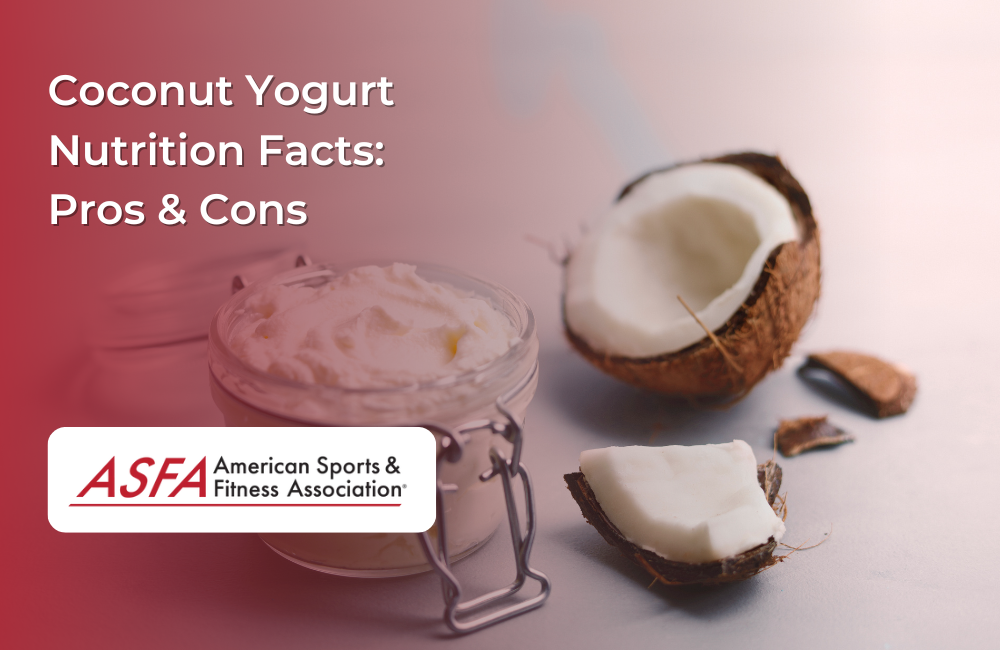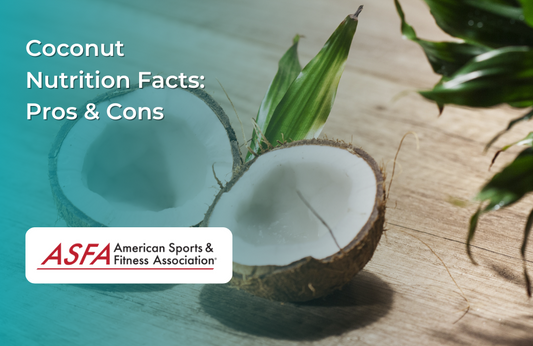Coconut yogurt is a dairy-free, plant-based yogurt alternative made from coconut milk and probiotics. It is a popular choice for those who are lactose-intolerant, vegan, or prefer non-dairy options. While it provides healthy fats and probiotics, it can also be high in calories and added sugars depending on the brand.
Coconut Yogurt Nutrition Facts Pros Cons: A Comprehensive Profile
Understanding coconut yogurt nutrition is essential, as one 6-ounce (170 grams) serving of unsweetened coconut yogurt provides:
-
Calories: 120-160
-
Carbohydrates: 2-8 grams (higher in sweetened versions)
-
Fiber: 0-1 gram
-
Sugar: 0-10 grams (varies by brand)
-
Protein: 1-3 grams
-
Fat: 9-15 grams
-
Saturated Fat: 8-12 grams
-
Calcium: 10-20% of the Daily Value (if fortified)
-
Probiotics: Contains live cultures for gut health
-
Vitamins and Minerals: May be fortified with vitamin D, B12, and calcium, but not always
In comparison, cow's milk provides higher protein and vitamin D content than coconut yogurt. Traditional cow's milk yogurt also offers more protein, calcium, and vitamins, making it a nutritionally richer option compared to coconut yogurt.
What is Coconut Yogurt?
Coconut yogurt is a popular dairy-free alternative to traditional yogurt, crafted from coconut milk instead of cow’s milk. This makes it an excellent option for those with lactose intolerance or anyone following a non-dairy diet. Coconut yogurt is rich in live and active cultures, which are beneficial bacteria that support a healthy gut microbiome. These probiotics can aid in digestion and boost the immune system, making coconut yogurt not just a tasty treat but also a healthful addition to your diet. Choosing plain yogurt, including plain coconut yogurt, helps avoid excess sugar and enhances health benefits.
Definition and Ingredients of Coconut Yogurt
Coconut yogurt is a delightful non-dairy yogurt made from the creamy goodness of coconut milk, which is extracted from the meat of mature coconuts. This non-dairy yogurt undergoes a fermentation process with probiotic bacteria such as Lactobacillus acidophilus and Bifidobacterium bifidum, resulting in a tangy and smooth texture similar to traditional dairy yogurt. Often, coconut yogurt is fortified with essential nutrients like calcium, vitamin D, and protein to enhance its nutritional profile, making it a wholesome alternative to dairy yogurts.
Pros of Eating Coconut Yogurt
Dairy-Free and Vegan-Friendly
A great alternative for people with lactose intolerance, dairy allergies, or those following a vegan diet, dairy free yogurt options like coconut yogurt are increasingly popular.
Contains Probiotics for Gut Health
Most coconut yogurts contain live probiotics that support digestion, gut microbiome balance, and immune health. However, traditional cow's milk yogurt typically contains higher levels of probiotics, which can further enhance digestion and boost immunity.
Rich in Healthy Fats
Contains medium-chain triglycerides (MCTs), which may boost metabolism and provide quick energy. These MCTs are also found in coconut oil, known for its health benefits and nutritional content.
May Support Heart Health (When Unsweetened)
-
Coconut contains natural plant compounds that may help reduce inflammation.
-
Choosing unsweetened versions avoids added sugars that can contribute to heart issues.
Can Be Fortified with Nutrients
Some brands add calcium, vitamin D, and B12, making it a good dairy alternative for bone health. Similarly, almond milk yogurts are often fortified with these nutrients, providing another excellent dairy-free option.
Naturally Low in Carbs (If Unsweetened)
-
Suitable for low-carb and keto diets when unsweetened, with as little as 2 grams of carbs per serving.
Creamy and Versatile
-
Can be used in smoothies, breakfast bowls, desserts, and as a dairy substitute in recipes.
May Improve Night Vision Due to High Vitamin A Content
One of the lesser-known benefits of coconut yogurt is its rich vitamin A content, which plays a crucial role in maintaining healthy vision. Vitamin A is essential for the regeneration of rhodopsin, a pigment in the retina that helps us see in low-light conditions. Regular consumption of coconut yogurt can support night vision and may reduce the risk of age-related macular degeneration, making it a valuable addition to your diet for eye health.
May Reduce Waist Circumference Due to High Fiber Content
Coconut yogurt is not just a tasty treat; it’s also a good source of dietary fiber, which includes both soluble and insoluble types. The fiber in coconut yogurt can promote a feeling of fullness, helping to curb hunger and potentially leading to weight loss and a reduction in waist circumference. Additionally, the fiber content helps regulate blood sugar levels and improve insulin sensitivity, contributing to overall metabolic health.
Cons of Eating Coconut Yogurt
High in Saturated Fat
-
8-12 grams per serving, which may be concerning for those managing cholesterol or heart health.
Low in Protein Compared to Dairy Yogurt
Only 1-3 grams of protein per serving, much lower than Greek yogurt (10-15 grams per serving). In contrast, soy yogurt offers a higher protein content, making it a valuable non-dairy option. Cow's milk also provides significantly more protein compared to coconut yogurt, along with additional vitamin D benefits.
Needs to be paired with other protein sources for a balanced meal.
May Contain Added Sugars
-
Flavored versions can contain 10+ grams of added sugar, reducing health benefits.
-
Opting for unsweetened coconut yogurt helps avoid excess sugar.
Not Always Fortified with Essential Nutrients
-
Some brands lack calcium, vitamin D, and B12, which are important for bone and overall health.
More Expensive Than Dairy Yogurt
Higher price due to ingredients and processing costs compared to regular yogurt, which is often more affordable and widely available.
Nutritional Comparison to Dairy Yogurt
When comparing coconut yogurt to dairy yogurt, there are some notable differences in their nutritional profiles. Coconut yogurt is naturally higher in saturated fats due to its coconut milk base, but it also offers a unique set of nutrients. While it is often fortified with calcium, vitamin D, and vitamin B12, it generally contains less protein and more calories than traditional dairy yogurts. This makes it important to consider your dietary needs and preferences when choosing between the two. Choosing plain yogurt, including plain coconut yogurt, helps avoid excess sugar and enhances health benefits.
Vitamins and Minerals in Coconut Yogurt
Coconut yogurt can be a good source of various essential vitamins and minerals, especially when fortified. Some of the key nutrients include:
-
Calcium: Essential for maintaining strong bones and teeth.
-
Vitamin D: Important for bone health and immune function.
-
Vitamin B12: Crucial for energy production and proper nerve function.
-
Potassium: Helps regulate blood pressure and supports overall cardiovascular health.
-
Zinc: Vital for immune function and wound healing.
-
Selenium: Acts as an antioxidant, protecting cells from damage.
These nutrients make coconut yogurt a nutritious choice, especially for those who need to avoid dairy products.
Choosing a Healthy Coconut Yogurt
Selecting a healthy coconut yogurt involves paying close attention to the nutrition label. Here are some tips to guide you:
-
Low Sugar Content: Opt for unsweetened or low-sugar varieties to avoid excess sugar intake.
-
High Protein Content: Look for brands that offer at least 5 grams of protein per serving to help meet your daily protein needs.
-
Live and Active Cultures: Ensure the product contains probiotics for gut health.
-
Fortification: Choose brands that are fortified with calcium, vitamin D, and vitamin B12 to support overall health.
-
Minimal Ingredients: Select products with fewer, more natural ingredients to avoid unnecessary additives.
By following these guidelines, you can enjoy the health benefits of coconut yogurt while making a nutritious choice.
Coconut Yogurt vs. Other Non-Dairy Yogurts
When comparing coconut yogurt to other non-dairy yogurts like soy yogurt and almond milk yogurt, several differences stand out. Coconut yogurt tends to be higher in saturated fat and calories, but it also offers a richer source of fiber and protein. Additionally, coconut yogurt contains medium-chain triglycerides (MCTs), which are easily absorbed and provide a quick source of energy. These unique attributes make coconut yogurt a distinctive and beneficial choice among non-dairy yogurts.
Potential Allergic Reactions and Interactions
While coconut yogurt is generally safe for most people, it’s important to be aware of potential allergic reactions and interactions with medications. Coconut is a common allergen, and some individuals may experience symptoms such as hives, itching, and swelling after consuming coconut products. Moreover, coconut yogurt may interact with certain medications, including blood thinners and diabetes medications. Therefore, it’s advisable to consult with a healthcare professional before incorporating coconut yogurt into your regular diet, especially if you have existing health conditions or are on medication.
Preparing Coconut Yogurt at Home
Making coconut yogurt at home is a simple and rewarding process. Here’s a basic recipe to get you started:
Conclusion
Coconut yogurt is a creamy, probiotic-rich, dairy-free alternative that provides healthy fats and gut-friendly bacteria. However, it is lower in protein, higher in saturated fat, and can contain added sugars. Choosing unsweetened, fortified versions and pairing it with protein sources can make it a healthier option.
FAQs
Is coconut yogurt healthy?
Yes, if unsweetened and fortified with nutrients, it can be a good dairy-free alternative with probiotics.
Is coconut yogurt good for weight loss?
It can be, but portion control is important due to high fat and calorie content.
Is coconut yogurt keto-friendly?
Yes, unsweetened coconut yogurt is low in carbs and fits well in a keto diet.
Is coconut yogurt high in protein?
No, it is low in protein (1-3g per serving) compared to dairy-based yogurts.
Does coconut yogurt contain probiotics?
Yes, most brands include live active cultures for gut health.
Can I eat coconut yogurt every day?
Yes, in moderation, but pair it with protein and nutrient-dense foods for a balanced diet.
How can I make coconut yogurt healthier?
-
Choose unsweetened, fortified varieties.
-
Add nuts, seeds, or protein powder to boost protein content.
-
Use it in smoothies, overnight oats, or as a topping for fruit and granola.
Does coconut yogurt contain dairy?
No, it is completely dairy-free and vegan-friendly, similar to other dairy free yogurts available on the market.





